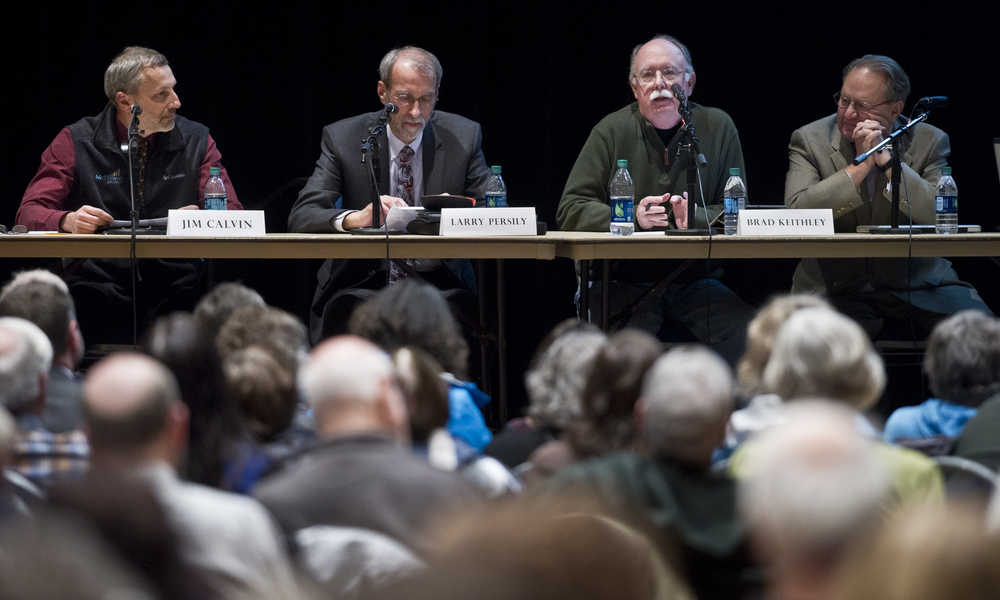Closing the state’s multibillion-dollar budget gap isn’t going to be easy. Neither is coming up with a solution that everybody can feel good about. To start, it’s likely going to require some combination of increasing revenue — likely through increased taxes — and diversifying the state’s economy, according to the presenters and panelists of Wednesday evening’s Juneau Forum on Alaska’s Fiscal Future.
But the tough economic realities staring down the state didn’t deter more than 300 people from the forum, which was the most well attended in a series of similar forums that have been held around the state, said Rep. Cathy Munoz and Sen. Dennis Egan, who briefly spoke to close the event.
The forum, which was held in Centennial hall, consisted of a presentation from Pat Pitney, director of the Office of Management and Budget, and an “expert panel analysis” of how Alaska should approach the state’s budget crisis.
As panelist Gregg Erickson, an economist who helped draft the state’s constitutional amendments that established the Permanent Fund, put it, “Alaska has been and remains a one-trick pony” and that trick is oil.
This has caused problems in recent years, however, as oil prices have fallen by about half. Alaska’s “pony” hasn’t been generating the revenue that it once did, which has left the state with an almost $3 billion “gap” in its unrestricted general funds, according to Pitney.
“If we don’t do anything, that savings account will be gone in two years,” she said. “The longer we kick this can down the road the closer we get to a $3 billion cliff.”
In order for oil to pull the state out of this slump, Alaska would have to increase its production from the roughly 500,000 barrels per day it currently produces to about 1.6 million barrels per day, Pitney said. That, or the price of oil would have to nearly double, which is not likely to happen.
There is a great disconnect between population, which is on the rise, and North Slope Oil production, which is on the decline (along with oil prices). And the disconnect is growing.
“We don’t see the possibility that price or production are going to save us anytime soon,” Pitney said.
Bruce Conant, who has lived in Alaska for 40 years, was one of the nearly 300 people in attendance.
“This event was really good because it informed people who may not be paying attention to the budget situation,” Conant said. “For the disbelievers, it helps make the case that something needs to be done.”
Finding common ground about what needs to be done is another matter entirely. According to Erickson, the crisis facing the state is “economic, not fiscal.”
“The big difference is a fundamental decline in what we sell to the rest of the world,” he said. And this is not a problem that will permanently be solved, in his view, by fiscal measures such as budget cuts.
Erikson and fellow panelists Larry Persily and Jim Calvin said the dilemma will need to be solved, at least in part by upping taxes. That’s a plan Pitney also mentioned.
“We should aspire to have the lowest tax rate in the nation, but the reality is we may have to go up some to offset this,” she said.
Persily, the former federal coordinator for Alaska North Slope natural gas projects, pushed the tax approach fairly hard. The way he sees it taxes are a fair way for people to pay the community back for the infrastructure that has enabled them to thrive economically.
Calvin, managing principal with McDowell Group, agreed and said that he favors a graduated income tax over sales tax increases, which are regressive. On this point, he Persily and Erickson agreed. Brad Keithley, the fourth panelist, however, did not.
Keithly, president of Keithley Consulting LLC, an Alaska-based oil, gas and fiscal policy consultancy firm, said that increasing taxes are exactly what the state needs to avoid doing now.
“We’re heading into a recession,” he said. “The last thing we want to do is to take money out of people’s hands. That’s not what you do when you’re going into a recession.”
All panelists agreed that additional spending cuts will need to be made.
But for former Juneau mayor Bruce Botelho, who organized the event, the panelists’ suggestions weren’t as important as the dialogue they hopefully created in Juneau.
“The goal wasn’t to reach a specific conclusion about a course of action, but to raise awareness,” he said, adding he thinks the event did just that.

